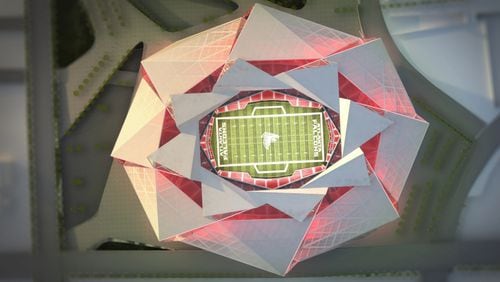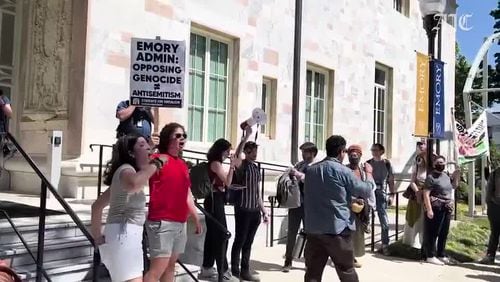A billion dollars doesn’t go as far as it used to.
The Atlanta Falcons revealed Monday that the projected cost of their new downtown stadium has risen to $1.2 billion, a jump of $200 million from the $1 billion figure that the team long used as a ballpark estimate.
The increased cost does not change the amount of taxpayer money going into the project.
To put the rising price of sports palaces in perspective, the increase alone would have been almost enough to pay for the Georgia Dome, which was completed in 1992 at a cost of $214 million. The Dome will be demolished when the new stadium opens in 2017.
Falcons president Rich McKay attributed the revised budget to a variety of factors, including the plan for an “iconic” eight-sided design, complex retractable roof and 62,000-square-foot video screen within the roof opening. Also driving the price higher, McKay said, were the costs of property acquisition, related road work and weather-proofing an indoor-outdoor facility.
As specified in the deal struck early this year, bonds backed by Atlanta’s hotel-motel tax will cover $200 million of the cost of building the stadium. The rest will come from the Falcons, the NFL and personal seat license sales.
The NFL agreed in May to provide $200 million, but the Falcons haven’t said how much of the remaining $800 million they hope to raise from a seat-license program in which fans will be asked to pay one-time fees for the right to purchase season tickets.
McKay said the Falcons were not surprised by the need to increase the stadium budget in light of team owner Arthur Blank’s embrace of a complex design proposed by the lead architect, Kansas City-based 360 Architecture.
“Maybe the amount (of the increase was surprising), but not that the number was going up,” McKay said in an interview after a Monday meeting of a Georgia World Congress Center Authority committee.
“We never wavered from the design,” McKay added. “As opposed to backing off from it to get to a budget that was in a document somewhere, we continued to enhance it, so that drives a lot of that (added) cost.
“The fact the stadium doesn’t have straight lines, the fact you’re creating eight corners of the building — when you start bending buildings, there’s cost implied in that. And the roof is not the most simplistic and therefore is not inexpensive. But it was an element we wanted because it really sold the idea to us that the roof is a design element … whereas in many other buildings it is completely nondescript.”
The Falcons didn’t provide a breakdown of costs for specific stadium elements but allocated the $1.2 billion to these broad categories: $102 million for development and pre-construction expenses, including property acquisition and related road work; $73 million for design and professional services; $77 million for systems and equipment; and $948 million for construction and contingency funds.
The price is in the ballpark with the current generation of NFL stadiums.
The Dallas Cowboys’ stadium, which opened in 2009 in Arlington, Texas, cost $1.3 billion. The San Francisco 49ers’ stadium, under construction in Santa Clara, Calif., recently raised its budget from $1.2 billion to $1.3 billion. The Minnesota Vikings plan to break ground next year on a stadium with a budget of $975 million but reportedly are struggling to stay within that amount.
Georgia World Congress Center Authority executive director Frank Poe said the Falcons’ revised budget “is just a reflection that (Blank) wants this building to be iconic.”
The GWCCA is the state agency that operates the Georgia Dome. The new stadium will become part of the Congress Center’s downtown campus.
The budget, McKay said, is intended to include all costs except for the GWCCA’s portion of property acquisition on or near the stadium site.
The GWCCA previously agreed to pay part of the price for Mount Vernon Baptist Church’s property and also is attempting to acquire five other small parcels. The GWCCA has $15 million available for property acquisition, Poe said, including its $6.2 million portion of the Mount Vernon deal reached last month. The Falcons are paying the other $8.3 million for Mount Vernon and all of the $19.5 million for neighboring Friendship Baptist Church’s property.
If the stadium price continues to rise, cost overruns would be the Falcons’ responsibility, according to the agreement reached early this year among the team, GWCCA and City of Atlanta.
“We’re going to have to try to manage the budget from here as well as we can,” McKay said. “But we feel pretty good that the building as designed can be delivered to the number we (now) think.”
About the Author







